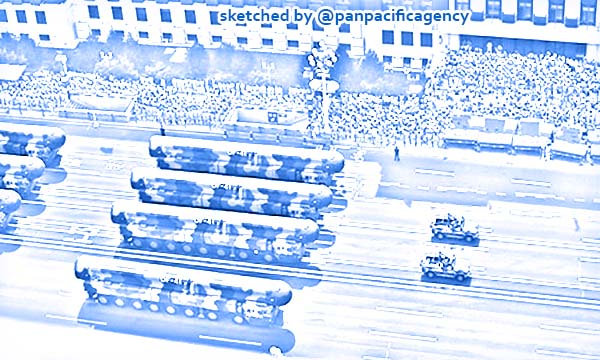US, Russia arms talks start with little hope of accord

China reveals its most advanced nuclear-armed intercontinental ballistic missile, the DF-41, at the National Day parade in Beijing on October 1, 2019. Photo: Fan Lingzhi/GT. Sketched by the Pan Pacific Agency.
WASHINGTON D.C., Jun 22, 2020, IB Times. The United States and Russia meet Monday in Vienna for talks on their last major nuclear weapons agreement against a backdrop of growing tensions and differences over whether they see any value in arms control at all, IB Times reported.
US President Donald Trump insists that China should be involved in the talks on New START, the treaty that caps US and Russian nuclear warheads, because he says up until now Beijing has had a free pass to do as it likes in developing weapon systems.
China has shown no sign of being interested, giving Washington fresh cause for complaint, although critics say the US finds that a useful stick with which to beat its growing rival.
The delegations made no statement when they arrived at 8:30am (0630 GMT) at the Niederoesterreich Palace in the Austrian capital where the talks are taking place.
Daryl Kimball, executive director of the Washington-based Arms Control Association, said the insistence on including China showed the Trump administration was not serious about an accord.
“The only conclusion I can come to is that… the Trump administration (does) not intend to extend New START and is seeking to display China’s disinterest in trilateral arms control talks as a cynical excuse to allow New START to expire,” Kimball said.
Trump has already scrapped several treaties with Russia — on overflights and on intermediate-range nuclear forces.
US ambassador Marshall Billingslea and Russian Deputy Foreign Minister Sergei Ryabkov are nonetheless to discuss the future of the New START treaty, which was agreed in 2010 and expires in February 2021.
That leaves very little time to renew a complex deal, let alone negotiate a new treaty involving China, especially with a November presidential election looming.
The current treaty limits each side to 1,550 deployed nuclear warheads.
China’s nuclear arsenal is rapidly expanding but is still far smaller than those of the US and Russia.
Speaking over the weekend, Ryabkov played down prospects when he said that while it would be “correct and logical” to agree an extension, the future of the world was not solely dependent on it.
The deadlock over New START and the demise of other nuclear arms control treaties “suggest that the era of bilateral nuclear arms control agreements between Russia and the USA might be coming to an end,” said Shannon Kile of the Stockholm International Peace Research Institute.
According to the institute’s latest research, Russia has 6,375 nuclear warheads, including those that are not deployed, and the United States has 5,800.
China comes a distant third with 320 warheads.
Song Zhongping, a defence analyst in Beijing, said 2,000 warheads would be an ideal arsenal for China, whose main concern is to counter the United States.
“China will never participate in nuclear disarmament negotiations between the US and Russia,” he said.
“The nuclear disarmament talks proposed by the US are only a trap.”
Russian political analyst Fyodor Lukyanov said there was no reason to expect any progress in Vienna.
“The Trump administration has rejected nearly all the restraints linked to the treaties agreed in the past,” Lukyanov said.
“There is nothing to suggest that this treaty will be the exception.”
By Sylvie LANTEAUME, with Maria PANINA in Moscow and Ludovic EHRET in Beijing.